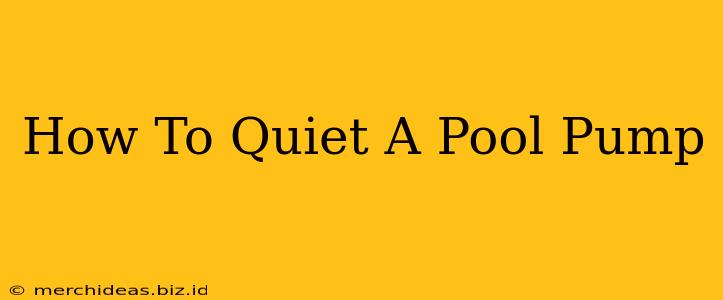A noisy pool pump can be a real headache, disrupting your peaceful enjoyment of your backyard oasis. But don't despair! A loud pump isn't necessarily a broken pump. Often, simple adjustments and maintenance can significantly reduce the noise level. This comprehensive guide will walk you through several effective methods to quiet your pool pump, from simple troubleshooting to more involved solutions.
Understanding the Sources of Pool Pump Noise
Before diving into solutions, it's crucial to understand why your pool pump is noisy. Several factors can contribute to excessive noise:
1. Air in the System:
Air trapped within the pump or plumbing lines can cause significant rumbling and gurgling sounds. This is often the easiest problem to fix.
2. Loose or Worn-Out Parts:
Over time, vibrations from the pump can loosen screws, bolts, or even cause parts to wear down. This can lead to rattling and clanking noises.
3. Cavitation:
This occurs when the pump struggles to draw enough water, leading to the formation of vapor bubbles that implode, causing a rattling or knocking sound. This often indicates a problem with the pump's suction side.
4. Bearing Wear:
The pump's bearings are crucial for smooth operation. Worn bearings produce a high-pitched whine or squeal. This often indicates a more serious problem requiring professional attention.
5. Motor Problems:
Electrical issues within the motor can generate buzzing, humming, or grinding noises. This often requires professional diagnosis and repair.
6. Improper Installation:
If the pump wasn't installed correctly, it might be vibrating against its base or other components, leading to excessive noise.
Quieting Your Pool Pump: Practical Solutions
Now that you understand the potential causes, let's explore solutions to quiet your noisy pool pump:
1. Bleed the Air from the System:
This is the first step in troubleshooting. Check your pump and plumbing for air bleed valves and carefully open them to release any trapped air. Consult your pool pump's manual for specific instructions on bleeding air.
2. Tighten Loose Connections:
Inspect all bolts, screws, and connections on the pump and plumbing. Tighten any loose components to minimize vibrations. Pay close attention to the pump's mounting bolts and the connections to the piping.
3. Check the Pump's Suction Side:
Ensure there's no debris clogging the strainer basket or any other restrictions on the suction side. A clogged strainer can cause cavitation, leading to a noisy pump.
4. Install Vibration Dampeners:
Vibration dampeners are readily available and can be incredibly effective in reducing noise. These are typically rubber mounts or pads placed between the pump and its base. They absorb vibrations, significantly reducing the noise transfer.
5. Build a Pump Enclosure:
Constructing a small enclosure around the pump, using sound-absorbing materials such as acoustic foam or insulated panels, can significantly reduce the noise level. Make sure there's adequate ventilation to prevent overheating.
6. Consider a Variable Speed Pump:
Variable speed pumps offer quieter operation compared to single-speed pumps. They allow you to adjust the pump's speed, reducing noise and energy consumption. This is a more significant investment but provides long-term benefits.
When to Call a Professional
If you've tried these steps and your pool pump remains excessively noisy, it's time to call a qualified pool service technician. Problems like worn bearings or motor issues require professional diagnosis and repair. Ignoring these problems can lead to further damage and costly repairs down the line.
Keywords: quiet pool pump, noisy pool pump, pool pump noise, reduce pool pump noise, fix noisy pool pump, pool pump troubleshooting, pool pump maintenance, quiet pool pump solutions, vibration dampeners for pool pump, variable speed pool pump, pool pump repair.
